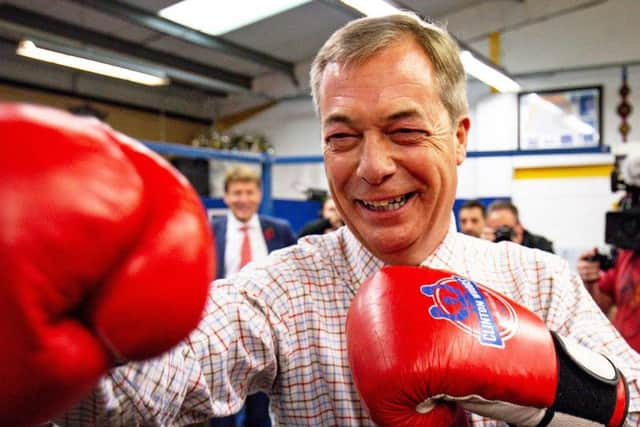Why Nigel Farage's Brexit Party could hurt the Conservatives, not Labour, in Boris Johnson's Yorkshire target seats
It ranged from the overt - Boris Johnson's big speech in Manchester where he promised to fund trans-Pennine high speed rail - to the slightly more subtle - the Towns Fund offering £25m for a host of northern towns in a move described a "one-off pre-election stunt" by a Yorkshire council leader.
Everything we've seen fits in with a narrative about the political leanings of the North that's become pretty much a given for those in Westminster circles speculating about how the General Election might go.


Advertisement
Hide AdAdvertisement
Hide AdSuch a feat, should it be achieved, would compensate for losses in the Remain-backing South and earn the Tories a majority to force through their Brexit plans.
But is it actually likely to happen? A large part of the answer will depend on how well Nigel Farage's Brexit Party performs across the North, something which is proving hard to predict in the current volatile political climate.
In a speech a week ago Mr Farage boasted of posing a "major problem" in the North to a Labour Party he described as representing "Hampstead, not Huddersfield, and Dalston, not Doncaster".
But Professor Rob Ford, a University of Manchester academic who casts a forensic eye over election trends, suspects the Brexit Party will likely cause more problems to the Conservatives than Labour.
Advertisement
Hide AdAdvertisement
Hide AdHe points out that even in Labour seats whose constituents voted to Leave in the 2016 EU referendum, most Labour supporters voted to Remain. Brexit-backing voters who supported Ukip in the election a year earlier went almost entirely to the Conservatives in the 2017 poll. All this means that a strong Brexit Party performance may end up taking more votes from the Tories than Labour.
To take Labour-held, Brexit-backing Wakefield, one of the Tory target seats, as an example, Conservative candidate Antony Calvert earned 6,000 more votes in 2017 than in 2015 as the Ukip vote collapsed.
If they go back to the Brexit Party, whose candidate is Robert Bashforth, described in a recent article as a former assistant headmaster at a Wakefield secondary school, in large numbers the chances of Mr Calvert turning over the 2,176 vote majority sitting MP Mary Creagh will be substantially reduced.
Ironically, a good showing by the pro-Remain Liberal Democrats - who received fewer than 1,000 votes in 2010 but more than 7,000 at the height of their recent popularity in 2010 - could swing the result the other way.
Advertisement
Hide AdAdvertisement
Hide AdAll of which makes this seat, like many other marginals in Yorkshire, hard to predict. With 'no overall majority' now an odds-on favourite with the bookmakers, we may see Boris Johnson try and pull more rabbits out of the hat for northern voters between now and December 12.